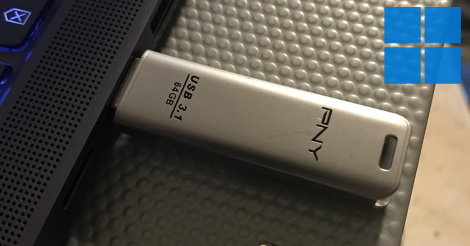Creating a Bootable Windows USB From Linux
Worth knowing in order to make a bootable USB memory stick with Windows on from Linux.

By. Jacob
Edited: 2022-07-29 14:38

After at least a few days (in total, since the problem is recurring) trying to create a bootable Windows 10 USB from Linux, I must acknowledge the simple state of things; the fact is that it does not matter what tool you use if somehow your memory stick is not bootable or compatible – it is just not going to work.
As far as I can tell, something is just different with Windows that causes some memory sticks not to work.
You will probably have noticed that there is a lot of tutorials on this topic, and none of them appears to work. This is not necessarily because they are wrong; it could just be your memory stick that is not compatible. This is what I found.
I have probably spent several hours in total trying to solve this problem, and this is to the point that I am afraid it is wearing down my USB sticks. I tried in almost all thinkable ways, and followed all the tutorials I could find. Nothing works. Creating Windows boot media from Linux is severely and utterly broken. But then I simply switched to another USB stick, and then it worked, for no apparent reason.
I tried a tool called WoeUSB that I found on GitHub, but not only is this tool slower than a snail at creating the media, when finally it finishes up, still my Lenovo Yoga Slim 7 bios did not recognize the USB stick! I finally managed to get this tool to work simply by trying a 8GB stick instead of the 64GB PNY stick.
Get WoeUSB here: https://github.com/WoeUSB
This problem is just so weird.
Things I tried so far on the 64GB PNY stick:
- Formatting the stick as exfat, copying the files from the mounted ISO.
- Formatting as NTFS, copying the files from the mounted ISO.
- Same as 1. But with "bootable" checked, and MS-DOS partition table.
- Same as 1. But with "bootable" checked, and GPT partition table.
- Same as 2. But with "bootable" checked, and MS-DOS partition table.
- Same as 2. But with "bootable" checked, and GPT partition table.
- Using dd to write the ISO to the drive.
- Using unetbootin (Does not even register the USB stick).
- Using the KDE disk tool. Fails, because UDF filesystem is not bootable. Doh!
- Using WoeUSB. Specifically: sudo ./woeusb -p Win10_21H2_English_x64.iso /dev/sda1
- Using Rufus in Wine; this does not work in Ubuntu 21.10 (Impish Indri), because Wine has unmet dependencies in 21.10.
In fact, the problem has become so bad that I have not even been able to get rufus to work consistently lately from Windows. It looks like the problem may be that some USB sticks simply refuses to boot with Windows on; the strange part is, they work just fine with Linux!
I suppose, in theory, even using dd should work, given you have a USB stick that somehow works with Windows. The problem with dd is that the resulting file system will be ISO9660 or UDF, which Windows will not boot from.
The exact reason why my 64GB stick does not work, even with a compatible file system like NTFS or exFAT, remains a mystery to me.
Installing on external Hard Disks
I realize you do not have to install your OS on your internal hard disk.
It is usually going to be faster, however. But, recent USB standards are now so fast that it is worth considering such alternative setups if you switch between Linux and Windows a lot.
If you have USB3.0, then you might already benefit from the Full Duplex Superspeed feature, meaning that is will be capable of both sending and receiving data at the same time. In comparison, the older USB2.0 standard is only Half Duplex, and can not both send and receive simultaneously.
Also, if your external hard disk supports USB3.2, it should also enable 20Gbps transfer speeds in dual-lane mode, or 10Gbps in single-lane mode (not to be confused with half/full duplex). If you use a USB-C cable when connecting, dual-lane should be used, while standard USB connectors might fall back to single lane mode.
Links
- What is it that makes some USB sticks not-bootable? - superuser.com
- How can I identify which of my USB drives can be made bootable? - superuser.com

Tell us what you think: